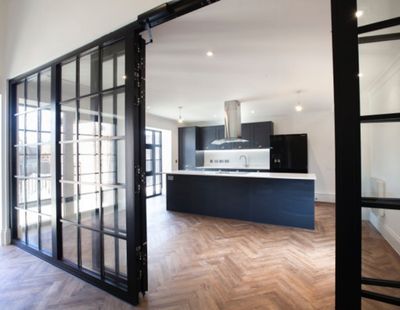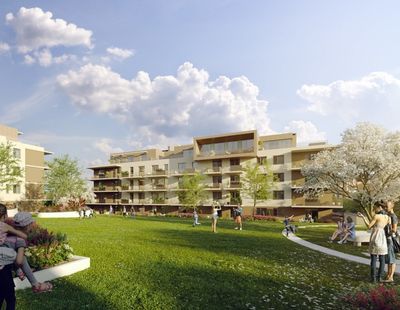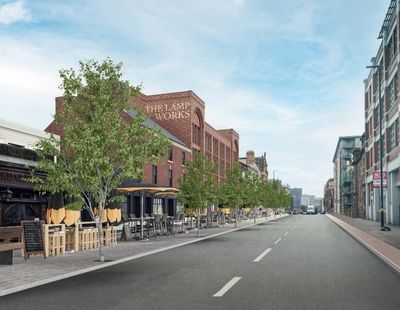In this Q&A, Blackswan managing director Marcus Hawley answers our questions on the acquisition, the continuing appeal of Birmingham, the property trends for the year ahead and the company's reaction to Covid, as well as the importance of sustainability, design and heritage in property development.
Can you tell us a bit more about Blackswan's acquisition by Cordia? How did this come about?
We were working on a JV (joint venture) proposal together and we realised that the two businesses had more synergies than we could have anticipated. It was through that process we learned that Cordia was continuously seeking for expansion opportunities, not only in UK, but across Europe, and we also knew that Blackswan had reached its limits as a smaller developer. We have always had big ambitions and needed to make a change to fulfil those aspirations.
In addition, we were also very happy to learn that Cordia and Blackswan had shared values and a common vision and therefore made a great cultural fit. For example, creativity and innovation are key parts of the design approach for both companies and the combined vision for Cordia Blackswan is to create new, well-designed places where people want to live, work, play and learn.
Why should people be considering living, investing or working in Birmingham? Won't Covid-19 be encouraging people away from the cities?
Covid has been a very difficult event nationally and at every level, however what the national press has not picked up is how the Birmingham community of businesses and residents have rallied together to survive this crisis. Birmingham City Centre’s population and business community is small enough to feel like you know everybody, but large enough to be exciting, creative, and inclusive, which means that now we do not seem to be facing the same brain drain facing other cities and there is a strong feeling of everyone working together to get us back on our feet.
It is that feeling of togetherness and community that will drive the desire to live, work and invest in Birmingham over the next five years and why I think Birmingham may in fact be a beneficiary from other less vibrant regional cities.
We are fortunate that Birmingham has a compact city centre that is inherently very walkable, making city centre living remain very appealing in these times.
However, we do recognise that there may well be a small number of people that may choose to move away from the centre because of Covid, but Birmingham has several beautiful garden suburbs such as Bournville and Harborne, all with excellent access to the city centre and with more award-winning green spaces and parks than any other European city. So we do not foresee the overall Birmingham city-living being overly affected by Covid.
What do you think the main property trends will be for the year ahead?
We believe there will be a further trend towards stable assets, for which PRS is the standout asset class. We are looking to engage with long-term investors to provide models which give low management, stable, long-term returns.
As traditional housing delivery continues to fail to deliver the necessary levels of supply, we anticipate further growth in the alternative housing sector, of which PRS is one element, but we also believe there will be a growth in the breadth of the co-living sector to have wider appeal and a customer base beyond solely the young professional cliché.
Early career housing, loneliness and single person accommodation are all major issues and co-living in some form could start to form part of the answer.
Will the fallout from Covid and Brexit have any impact on the Birmingham market?
Birmingham has always had long-term structural housing supply problems; there is a massive shortfall of new dwellings both in the city centre and in the suburbs. There are no districts of empty apartments in Birmingham, there is a significant unmet demand in all areas of the market.
Whilst we are predominantly focused on the residential side, we also have some commercial units within our developments and where Covid really has affected the Birmingham market are the hospitality and entertainment sectors, which have been a huge part of Birmingham’s burgeoning renaissance in the past ten years. In our new commercial schemes, we are already engaging with these strong local groups to see how we can work together to create a sustainable business model for the future.
How important is sustainability to you when designing and carrying out new developments?
Sustainability in its widest interpretation is extremely important to everything that we do and our business model, which centres on sustainable buildings and communities, combined with a sustainable business model that is not based on boom-and-bust economics.
Whether we are selling apartments, developing PRS for the long-term, or newer concepts such as co-living, their longevity is at the forefront of our design process. It is only through this process that you develop sustainable long-term returns and leave a legacy that you can be proud of.
Sustainability is not only important to us in the UK, but especially to our parent company, the Futureal Group, which is not only a founding member of the Hungarian Green Building Council, but also whose developments are designed and constructed in-line with BREEAM, LEED and more recently the Well Building standards.
Have you had to rethink the design of your developments as a result of Covid, and the greater desire for outdoor space, greenery and home-working space?
We were very lucky that most of our developments were in the pre-construction phase when Covid first hit and so we had the ability to change the design where it made sense to do so. We are not only trying to have balconies or terraces as standard features in majority of the new homes that we build, but for them also to be usable outdoor spaces where people can sit, eat, relax, or exercise.
In addition, we have changed the mix of units we produce to increase the number of study spaces to accommodate the shift more easily towards home working. Within our PRS and co-living developments, we are including work pods within amenity spaces so that people do not have to work from their kitchen tables.
Finally, we are using technology to improve the health of buildings, including contactless systems for lifts and doors, improved ventilation and smart systems that can remotely monitor the number of people in a space to allow us to ensure the adequate level of ventilation and cleaning, etc.
What is in Cordia Blackswan's pipeline? And why is heritage so important to this?
We have a whole range of developments in our pipeline, from boutique 20-unit conversions in beautiful heritage buildings, through to a 400-plus unit new build skyscraper. We do not solely work with historic buildings but believe that heritage buildings add character and vibrancy to a wider area or development, characteristics that are sadly lacking from many new-build developments.
Will you be expanding overseas - to Hungary or elsewhere in Europe - as a result of the Cordia tie-up? Or are you remaining focused on the UK, and in particular the West Midlands?
For now, the Midlands will remain our focus and Cordia will continue to operate and expand across Europe as part of their wider international expansion strategy.



















Join the conversation
Be the first to comment (please use the comment box below)
Please login to comment